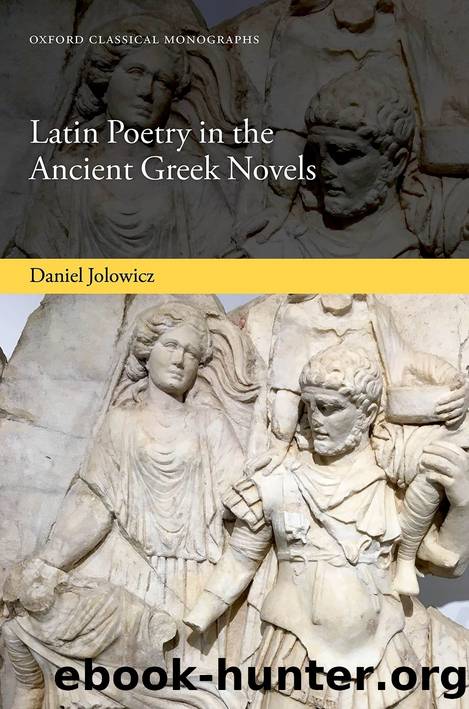Latin Poetry in the Ancient Greek Novels by Jolowicz Daniel;

Author:Jolowicz, Daniel; [Jolowicz, Daniel]
Language: eng
Format: epub
Publisher: Oxford University Press USA - OSO
Published: 2021-03-21T00:00:00+00:00
In her first speech too, Dido had invoked her tears as part of her petition (per ⦠has lacrimas, 4.314). Both women express surprise at the failure of their tears (fletu ⦠nostro; Ïá½° á½Î¼Î¼Î±Ïα δακÏύονÏα ⦠δάκÏÏ Î±) to batter their men into submission (καÏέκλαÏϵ; uictus), and couch their utterances as part of a series of rhetorical questions that begin with a negative (or implicitly negative) interrogative particle (οὠ⦠; num ⦠?).37 Given the dacryphilia of Clitophon (discussed in Section 4.9), the emphasis on Vergilian tears here is unsurprising. Moreover, the Latin tradition governing the characterization of Aeneas and Jason offers several precedents for Meliteâs attribution of perfidy (á¼ÏιÏÏϵ), foreignness (βάÏβαÏϵ), and banditry (λá¿ÏÏῶν; λá¿ÏÏá½µÏ) to Clitophon that, in their combination, are absent from the surviving Greek tradition: in the Aeneid, Amata refers to Aeneas as a âperfidious banditâ (perfidus praedo, 7.362), and the Trojan women pray to Pallas Athene to destroy Aeneas, whom they describe as a âPhrygian pirateâ (Phrygii praedonis, 11.484); and Medea in Ovidâs Heroides reproaches Jason as a âforeign banditâ (peregrinus latro, 12.111).
Achilles and Vergil trade on the haziness of the connubial status obtaining between the two partners. It is never entirely clear whether Melite or Dido are officially married to their men, whether âmarriageâ serves rather as a figure of speech for sexual relations, or indeed whether it means one thing to the female partner and another to the male. When Satyrus first pitches to Clitophon the idea of relations with Melite, he is explicit that he is not suggesting that Clitophon should become her âhusbandâ (á¼Î½Î´Ïα, 5.11.6). Shortly afterwards, Melite and Clitophon exchange oaths in the Temple of Isis, including a promise that she will make him her âhusbandâ (á¼Î½Î´Ïα), which Clitophon refers to as a âcovenantâ (Ïῶν ÏÏ Î½Î¸Î·Îºá¿¶Î½, 5.14.2â3). From this point, their union is repeatedly labelled a âmarriageâ (γάμοÏ) by all those involved (Melite, Clitophon, Satyrus, Leucippe), although the sense often appears to be coterminous with physical sex.38 Indeed, Clitophon and Melite question the legitimacy of their marriage on the basis of the fact that it has not been consummated (5.20.2â3), and, towards the end of her first speech, Melite derisively refers to her âshadow of a marriageâ (Ïῶν γάμÏν ἡ Ïκιά, 5.25.8). A similar confusion vexes the status of the relationship between Dido and Aeneas, a confusion that is itself reflected in the scholarship.39 Dido persuades herself that the ominous ministrations in the cave during the storm constitute a legitimate marriage, although Vergil hints that this might be a psychological defence mechanism by which to assuage her guilt over Sychaeus: âShe calls it âmarriageâ, and with that name veils her sinâ (âconiugiumâ uocat, hoc praetexit nomine culpam, 4.172). In her first speech, she twice refers to the clasping of right hands (data dextera, 4.307; dextram tuam, 4.314), which symbolically reflects the promise and acceptance of marriage,40 as well as more overtly to their marital union (per conubia nostra, per inceptos hymenaeos, 4.316). In response, Aeneas explicitly denies the existence
Download
This site does not store any files on its server. We only index and link to content provided by other sites. Please contact the content providers to delete copyright contents if any and email us, we'll remove relevant links or contents immediately.
| Administration & Medicine Economics | Allied Health Professions |
| Basic Sciences | Dentistry |
| History | Medical Informatics |
| Medicine | Nursing |
| Pharmacology | Psychology |
| Research | Veterinary Medicine |
Machine Learning at Scale with H2O by Gregory Keys | David Whiting(3654)
Fairy Tale by Stephen King(2963)
Will by Will Smith(2589)
Hooked: A Dark, Contemporary Romance (Never After Series) by Emily McIntire(2428)
Rationality by Steven Pinker(2156)
Friends, Lovers, and the Big Terrible Thing by Matthew Perry(2013)
The Becoming by Nora Roberts(1928)
Love on the Brain by Ali Hazelwood(1824)
HBR's 10 Must Reads 2022 by Harvard Business Review(1702)
The Strength In Our Scars by Bianca Sparacino(1701)
A Short History of War by Jeremy Black(1677)
Leviathan Falls (The Expanse Book 9) by James S. A. Corey(1530)
515945210 by Unknown(1524)
Bewilderment by Richard Powers(1454)
443319537 by Unknown(1400)
A Game of Thrones (The Illustrated Edition) by George R. R. Martin(1374)
The Real Anthony Fauci: Bill Gates, Big Pharma, and the Global War on Democracy and Public Health (Childrenâs Health Defense) by Robert F. Kennedy(1337)
The 1619 Project by Unknown(1321)
Fear No Evil by James Patterson(1252)
